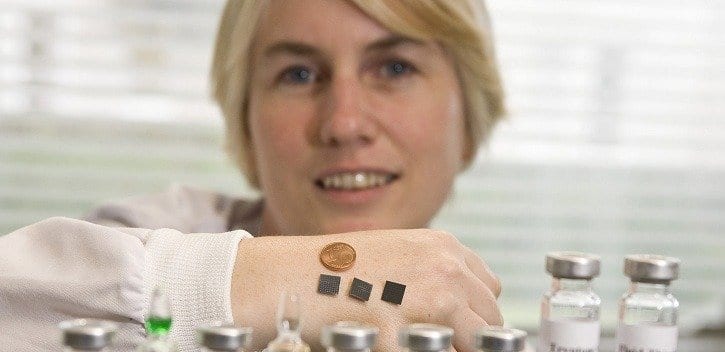
Researchers at UCC have developed a microneedle-based patch that results in increased vaccine-induced protection against malaria infection using lower doses of vaccine in pre-clinical testing.
The lead researcher, Dr Anne Moore, heads to Silicon Valley next week to meet venture capitalists and leading technology companies with a view to commercialising the research.
The microneedle-based patch also overcomes one of the main problems with this type of vaccine which relates to overcoming pre-existing immunity to the vaccine. The scientists combined two vaccine technologies to determine if immunity could be further enhanced and the research suggests that using a microneedle patch would overcome the need to make and use multiple different vaccine types to induce protective immunity to some of the world’s biggest killers. This could have significant consequences on the costs and logistics of vaccination.
The work was carried out by researchers in the School of Pharmacy, Dept. of Pharmacology and the Tyndall National Institute, UCC, led by Dr Anne Moore in collaboration with colleagues at the Jenner Institute, University of Oxford and was published byNature Publication Group in Scientific Reports and funded by Enterprise Ireland and Science Foundation Ireland. Dr Moore’s visit to Silicon Valley is being hosted by the Irish Technology Leadership Group (ITLG) as part of an SFI initiative for researchers to help them develop their entrepreneurial skills in the Get Started Venture Technology programme.
The skin patch has arrays of tiny silicon ‘microneedles’ that painlessly create temporary pores in the very outermost barrier layer of the skin, permitting the vaccine to flow into the skin, which is rich in cells of the immune system. The experimental vaccine was based on a live adenovirus. This virus is similar to those that can cause a common cold, but is engineered to be safer and to deliver a protein from the malaria-causing parasite, to the immune system.
The Latest on: Malaria vaccine
[google_news title=”” keyword=”Malaria vaccine” num_posts=”10″ blurb_length=”0″ show_thumb=”left”]
via Google News
The Latest on: Malaria vaccine
- Harnessing mRNA Vaccine Technology for Disease Preventionon April 28, 2024 at 7:01 am
World Immunization Week: 507 vaccines in late-stage development, 88 using mRNA tech to prevent TB, malaria, flu, COVID-19, RSV, Lyme disease, etc.
- R21 anti-malaria vaccine is a game changer: scientist who helped design it reflects on 30 years of research, and what it promiseson April 28, 2024 at 1:00 am
More than 600,000 people die of malaria each year. With low-cost, very effective vaccines being deployed we should be able to get this down to 200,000 or less by the end of this decade then the ...
- R21 Anti-Malaria Vaccine: A Breakthrough in the Fight Against a Deadly Diseaseon April 27, 2024 at 11:12 pm
Anti-malaria medication only lasts for days and parasites are building up resistance against these drugs as well.There are about 40 million children born every year in malaria areas in Africa who ...
- India-UK vaccine partnership helps fight malaria in African countrieson April 27, 2024 at 10:20 am
The only two WHO-approved malaria vaccines are developed by UK scientists at GSK and the University of Oxford and are now being manufactured at scale by Indian pharmaceutical companies. The GSK ...
- Malaria vaccine expansion will save lives, says WHOon April 26, 2024 at 5:01 pm
The World Health Organisation has said that an increase in malaria vaccines in Africa will boost access to malaria prevention and save many more lives, particularly of pregnant women, nursing mothers, ...
- WHO commends malaria vaccine roll-out in three more African countrieson April 26, 2024 at 3:20 am
Today’s launch brings to eight the number of countries on the continent to offer the malaria vaccine as part of the childhood immunisation programme." ...
- West Africa's Benin, Liberia and Sierra Leone launch malaria vaccinationon April 25, 2024 at 10:59 am
Benin, Liberia and Sierra Leone launched large-scale malaria vaccine programmes on Thursday under an Africa-focused initiative that hopes to save tens of thousands of children's lives per year across ...
- Three more African nations roll out malaria vaccineon April 25, 2024 at 10:40 am
Three more African countries have joined a rollout of malaria vaccines targeting millions of children in a continent that accounts for 95 percent of malaria deaths, the UN said Thursday.
- Q&A: Scientist who helped design R21 anti-malaria vaccine reflects on 30 years of research, and what it promiseson April 25, 2024 at 9:17 am
Until three years ago nobody had developed a vaccine against any parasitic disease. Now there are two against malaria: the RTS,S and the R21 vaccines.
- Vaccines are a glimmer of hope against malaria, but the battle has only just begunon April 25, 2024 at 6:10 am
By the time you reach the end of this article, three children will have died from malaria – a disease that casts a dark shadow over nearly half of the world’s population, claiming victims ...
via Bing News










